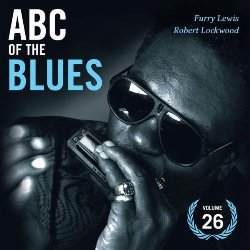ABC of the Blues CD26 (2010)
ABC Of The Blues CD26 (2010)

CD 26 – Furry Lewis & Robert Lockwood 26-01 Furry Lewis – Everybody’s Blues 26-02 Furry Lewis – Sweet Papa Moon 26-03 Furry Lewis – Kassie Jones Pt. 1 26-04 Furry Lewis – Billy Lyons and Stack-O-Lee 26-05 Furry Lewis – Judge Harsh Blues 26-06 Furry Lewis – John Henry play 26-07 Furry Lewis – Black Gypsy Blues 26-08 Furry Lewis – I Will Turn Your Money Green 26-09 Furry Lewis – Jelly Roll 26-10 Furry Lewis – Good Looking Girl Blues 26-11 Furry Lewis – Mistreatin’ Mama 26-12 Furry Lewis – Furry’s Blues 26-13 Furry Lewis – Mean Old Bed Bug Blues 26-14 Furry Lewis – Big Chief Blues 26-15 Furry Lewis – Why Don’t You Come Home Blues 26-16 Robert Lockwood – Dust My Broom play 26-17 Robert Lockwood – Pearly 26-18 Robert Lockwood – Aw Aw Baby [Sweet Home Chicago] 26-19 Robert Lockwood – Sweet Woman from Maine 26-20 Robert Lockwood – You’ve Gotta Stop This Mess
Furry Lewis (March 6, 1899 - September 14, 1981) was a blues guitarist from Memphis, Tennessee, USA. He was one of the first of the old-time blues musicians of the 1920s to be brought out of retirement by the folk blues revival of the 1960s.
Furry’s style of blues was in many ways typical of the songsters who operated in and around Memphis in the 1920s, for whom the value of a song was the story it told, and who tended to back their words with hypnotic repetitive riffs and subtle slide guitars. Furry Lewis’s soft voice and quick slide work were particularly effective in this style. He recorded many successful records in the late ’20s including “Kassie Jones”,Billy Lyons, Stack-O-Lee and Judge Harsh Blues (later called Good morning judge).
This success was limited to the race records of the time, cheap sides by black musicians for black customers. Furry received neither fame nor fortune for his efforts. In 1962, however, he was recorded by the folklorist Adrian Mitchell and his fortunes began to pick up. Before he died in 1981 Furry opened twice for the Rolling Stones, played on Johnny Carson’s Tonight show and had a part in a Burt Reynolds movie, some justice for this great player of the blues and his inimitable slide guitar style.
Joni Mitchell’s song, “Furry Sings the Blues” (on her Hejira album), is about Lewis. According to Wikipedia, Lewis despised the Mitchell song and demanded she pay him royalties.
Robert Lockwood, Jr., learned his blues firsthand from an unimpeachable source: the immortal Robert Johnson. Lockwood was capable of conjuring up the bone-chilling Johnson sound whenever he desired, but he was never one to linger in the past for long -- which accounts for the jazzy swing he often brought to the licks he played on his 12-string electric guitar.
Born in 1915, Lockwood was one of the last living links to the glorious Johnson legacy. When Lockwood's mother became romantically involved with the charismatic rambler in Helena, AR, the quiet teenager suddenly gained a role model and a close friend -- so close that Lockwood considered himself Johnson's stepson. Robert Jr. learned how to play guitar very quickly with Johnson's expert help, assimilating Johnson's technique inside and out.
Following Johnson's tragic murder in 1938, Lockwood embarked on his own intriguing musical journey. He was among the first bluesmen to score an electric guitar in 1938 and eventually made his way to Chicago, where he cut four seminal tracks for Bluebird. Jazz elements steadily crept into Lockwood's dazzling fretwork, although his role as Sonny Boy Williamson's musical partner on the fabled KFFA King Biscuit Time radio broadcasts during the early '40s out of Helena, AR, probably didn't emphasize that side of his dexterity all that much.
Settling in Chicago in 1950, Lockwood swiftly gained a reputation as a versatile in-demand studio sideman, recording behind harp genius Little Walter, piano masters Sunnyland Slim and Eddie Boyd, and plenty more. Solo recording opportunities were scarce, though Lockwood did cut fine singles in 1951 for Mercury ("I'm Gonna Dig Myself a Hole" and a very early "Dust My Broom") and in 1955 for JOB ("Sweet Woman from Maine"/"Aw Aw Baby").
Lockwood's best modern work as a leader was done for Pete Lowry's Trix label, including some startling workouts on the 12-string axe (which he daringly added to his arsenal in 1965). He later joined forces with fellow Johnson disciple Johnny Shines for two eclectic early-'80s Rounder albums. He also recorded a Robert Johnson tribute album and founded his own label, Lockwood. In 1998, he signed to Verve for the Grammy-nominated album I Got to Find Me a Woman, which featured sit-in guests including B.B. King and Joe Louis Walker. He was still working a weekly gig in Cleveland until early November 2006, when he suffered a brain aneurysm. He died on November 21.
download (mp3 @320 kbs):
yandex 4shared mediafire uloz.to ge.tt bayfiles
Zmieniony (Środa, 21 Sierpień 2019 21:04)








